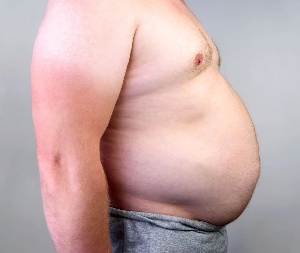Health News of Wednesday, 2 April 2025
Source: www.ghanawebbers.com
Effective Tips to Lose Belly Fat
**Belly Fat and Health Risks**
Excess belly fat can increase your risk of chronic conditions. It may lead to type 2 diabetes, heart disease, and more. Visceral fat, a specific type of belly fat, is particularly harmful.
Many health organizations use body mass index (BMI) to assess weight. However, BMI only considers height and weight. It does not account for body composition or visceral fat. Losing belly fat can be challenging, but there are effective strategies.
**1. Eat Plenty of Soluble Fiber**
Soluble fiber absorbs water and forms a gel in your digestive system. This helps slow down food digestion and promotes feelings of fullness. Studies show that increasing soluble fiber intake can reduce belly fat gain over time.
**2. Avoid Foods with Trans Fats**
Trans fats are created by adding hydrogen to unsaturated fats like soybean oil. They were once common in margarine and packaged foods but are now largely avoided. These fats are linked to inflammation, heart disease, and abdominal fat gain.
A study found that monkeys on a high trans fat diet gained significantly more abdominal fat than those on healthier diets.
**3. Moderate Your Alcohol Intake**
Small amounts of alcohol may have health benefits, but too much can be harmful. Research links heavy drinking to increased belly fat storage around the waist. Reducing alcohol consumption may help decrease waist size.
One study showed that daily drinkers who consumed less than one drink had less belly fat than those who drank infrequently but heavily.
**4. Reduce Your Stress Levels**
Stress triggers cortisol production from adrenal glands, leading to increased appetite and abdominal fat storage. Women with larger waists tend to produce more cortisol when stressed.
Engaging in stress-relief activities like yoga or meditation can help reduce belly fat.
**5. Limit Sugary Foods**
High sugar intake is linked to several chronic diseases like heart disease and type 2 diabetes. Observational studies show a connection between sugar consumption and increased abdominal fat.
Even natural sugars should be consumed in moderation to avoid gaining belly fat.
**6. Do Aerobic Exercise (Cardio)**
Aerobic exercise is effective for burning calories and improving health overall. Studies indicate it can also help reduce belly fat effectively.
The frequency and duration of aerobic exercise matter too; longer sessions yield better results for reducing overall body fat.
**7. Cut Back on Carbs — Especially Refined Carbs**
Reducing carbohydrate intake can aid in losing abdominal fat effectively. Low carb diets may benefit people at risk for type 2 diabetes or those with PCOS.
Replacing refined carbs with whole grains may improve metabolic health as well.
**8. Perform Resistance Training (Lift Weights)**
Resistance training helps preserve muscle mass while promoting weight loss efforts. Studies suggest it benefits individuals with prediabetes or fatty liver disease by aiding in belly fat loss.
Consulting a doctor before starting any weightlifting program is advisable for safety reasons.
**9. Limit Sugar-Sweetened Beverages**
Sugar-sweetened drinks contain high levels of added sugars like fructose which contribute to belly fat gain.
Research shows that consuming these beverages increases the likelihood of gaining abdominal fat compared to limited consumption.
Liquid calories often lead you to consume more overall calories later on without realizing it.
To lose belly fat, limit drinks such as soda, sweet tea, punch, or sugary mixers in cocktails.
**10. Get Plenty of Restful Sleep**
Adequate sleep is crucial for maintaining a healthy weight and preventing obesity-related issues.
Studies link insufficient sleep with higher risks of gaining excess weight.
Women who slept fewer than five hours per night were more likely to gain weight compared to those sleeping seven hours or more.
Sleep apnea has also been associated with excess visceral fat accumulation.
Aim for at least seven hours of quality sleep each night; consult a doctor if you suspect sleep disorders affecting your rest.











